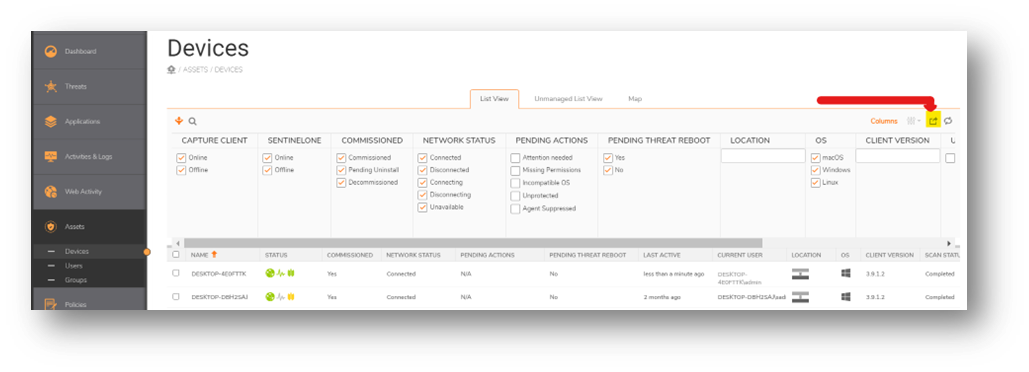-
Products
-
SonicPlatform
SonicPlatform is the cybersecurity platform purpose-built for MSPs, making managing complex security environments among multiple tenants easy and streamlined.
Discover More
-
-
Solutions
-
Federal
Protect Federal Agencies and Networks with scalable, purpose-built cybersecurity solutions
Learn MoreFederalProtect Federal Agencies and Networks with scalable, purpose-built cybersecurity solutions
Learn More - Industries
- Use Cases
-
-
Partners
-
Partner Portal
Access to deal registration, MDF, sales and marketing tools, training and more
Learn MorePartner PortalAccess to deal registration, MDF, sales and marketing tools, training and more
Learn More - SonicWall Partners
- Partner Resources
-
-
Support
-
Support Portal
Find answers to your questions by searching across our knowledge base, community, technical documentation and video tutorials
Learn MoreSupport PortalFind answers to your questions by searching across our knowledge base, community, technical documentation and video tutorials
Learn More - Support
- Resources
- Capture Labs
-
- Company
- Contact Us
SentinelOne agent command line tool



Description
sentinelctl is a command line tool that can be used to execute actions on a Windows/MACOS endpoint. This can be typically used to unprotect, unload/disable, load/re-enable, protect and perform policy updates for S1 Agent on your devices.  CAUTION: We recommend that you do not use this for any other purpose unless Support suggests.
CAUTION: We recommend that you do not use this for any other purpose unless Support suggests.
WINDOWS:
Open Command Prompt and run as an administrator
Go to the C:\Program Files\SentinelOne\Sentinel Agent <Version>
To run the tool: sentinelctl <command> [options]
To see all options of a command: sentinelctl -help
MACOS:
Open terminal
Go to the /Library/Sentinel
To run the tool: sudo sentinelctl <command> [make sure to run with sudo as it will only work when run as an admin]
To see all the options of a command: sentinelctl -help
Resolution
SENTINELONE COMMANDS:
To disable Anti-Tampering:
sentinelctl unprotect -k <S1 Passphrase>
 NOTE: Please refer to end of the article on how to obtain S1 passphrase
NOTE: Please refer to end of the article on how to obtain S1 passphrase
To Enable Anti-Tampering:
sentinelctl protect
To Stop the Agent Services:
sentinelctl unload -m -a
To Start the Agent services:
sentinelctl load -m -a
To connect a disconnected endpoint/To remove network quarantine and connect back to network:
sentinelctl unquarantine_net -k <S1 Passphrase>
To Restart the Agent Services:
sentinelctl reload -m -a
To Get the Status of Agent Services and Policy Basics:
sentinelctl status TIP: If you see the output for Mitigation Policy: none then it means "The Agent does not enforce policy with mitigation" whereas for Mitigation Policy: quarantineThreat means "The Agent enforces policy with kill and quarantine mitigation".
TIP: If you see the output for Mitigation Policy: none then it means "The Agent does not enforce policy with mitigation" whereas for Mitigation Policy: quarantineThreat means "The Agent enforces policy with kill and quarantine mitigation".
To Check if Full Disk Scan is in Progress:
sentinelctl is_scan_in_progress TIP: It will return the output as Full disk scan in progress: True or False
TIP: It will return the output as Full disk scan in progress: True or False
To Scan a Folder:
sentinelctl scan_folder -i path TIP: Use the option -i, --infile to scan a folder. If you do not use this parameter then the complete drive is scanned
TIP: Use the option -i, --infile to scan a folder. If you do not use this parameter then the complete drive is scanned
To Check if S1 Agent ever Connected to Management:
sentinelctl ever_connected_to_management EXAMPLE: Sample Output "Mgmt key part: 4ba007899be132d45a1590ds4f2ff2f2f031c4ffa3"
EXAMPLE: Sample Output "Mgmt key part: 4ba007899be132d45a1590ds4f2ff2f2f031c4ffa3"
To Enable or Disable IE protection:
sentinelctl ie_protection [-e|-d] -k <S1 Passphrase>
Options:
-e, --enable [Enables IE protection]
-d, --disable [Disables IE protection] NOTE: This command requires reboot to apply.
NOTE: This command requires reboot to apply.
To Disable Windows Security Center (WSC):
sentinelctl config agent.wscRegistration {1 | 0 } -k <S1 Passphrase> NOTE: It is not recommended to disable WSC. By default, the SentinelOne Windows Agent registers with WSC as anti-virus protection and Windows Defender is disabled.
NOTE: It is not recommended to disable WSC. By default, the SentinelOne Windows Agent registers with WSC as anti-virus protection and Windows Defender is disabled.
To Change the Configuration Values of S1 Windows Agent:
sentinelctl config [-p] parameter [-d] [-v] value [-f {json | default}] -k "S1 Passphrase"
Options:
-p, --parameter [Specify the parameter to get or change. This flag is optional, but if not used to prefix the parameter name, the -v flag must not be used to prefix the value]
-d, --delete [Undo the change last made to this value through sentinelctl]
-v, --value [Set the configuration of the parameter to this value. If a value is not given, output shows the current value. If the -p flag is not used to prefix the parameter name, the -v flag must not be used to prefix the value]
-f, --format [Output configuration to json format or two-column text. To save as a file, use a redirect]
-k, --key [If Anti-Tampering is enabled on the Agent, all configure commands require validation]
HOW TO OBTAIN S1 PASSPHRASE?
S1 Passphrase can be obtained by Capture Client admin (from management console) for the device. Go to Assets> Devices section and click on export icon  to download devices list
to download devices list
Look for "S1 Passphrase" in the csv file for the respective device in the downloaded list
Related Articles
- Capture Client Agent Return Codes - Phase 1
- Configure Email and Notification(Alerts) in Capture Client for Tenants






 YES
YES NO
NO